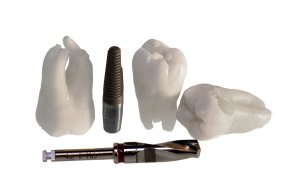-
What to Expect from Your Child’s Dental Visit
 You can schedule an appointment for your child with a family dentist in West County of St. Louis as soon as his or her first tooth begins to grow. Taking care of your child’s teeth and gums plays a crucial role in ensuring your child is off to a healthy start in life. If your child develops a dental disease that is left untreated, he or she can suffer serious oral health problems, including gum disease.
You can schedule an appointment for your child with a family dentist in West County of St. Louis as soon as his or her first tooth begins to grow. Taking care of your child’s teeth and gums plays a crucial role in ensuring your child is off to a healthy start in life. If your child develops a dental disease that is left untreated, he or she can suffer serious oral health problems, including gum disease.Daily brushing, good nutrition, and regular dental visits can all help prevent dental disease and cavities. Children learn healthy dental habits from their parents and caregivers, so it’s important to be a positive role model and continue to schedule your own appointments with the dentist. At your child’s first appointment, your family dentist will learn about your child’s health history and conduct a complete oral exam. This allows your dentist to check the growth and development and detect any oral health issues. Your dentist will also clean your child’s teeth and provide suggestions for daily dental care. He or she can also tell you if your child is getting enough fluoride.
-
The Benefits of Dental Implants
 Compared to other options for restoring missing or damaged teeth, dental implants in West County of St. Louis are often the first choice among dentists and dental patients. While other tooth restoration options can interfere with eating, smiling, and speaking, dental implants function like natural teeth. With proper care, dental implants can also last more than 10 years, so they offer a long-term solution to maintaining oral health. Here’s a closer look at the benefits of dental implants.
Compared to other options for restoring missing or damaged teeth, dental implants in West County of St. Louis are often the first choice among dentists and dental patients. While other tooth restoration options can interfere with eating, smiling, and speaking, dental implants function like natural teeth. With proper care, dental implants can also last more than 10 years, so they offer a long-term solution to maintaining oral health. Here’s a closer look at the benefits of dental implants.Protect Healthy Bone
If you have lost one or more permanent teeth, leaving the empty spaces in your mouth can lead to additional health issues, including gum disease. In addition, you will no longer be using your jawbone in the affected area to support your natural teeth. As a result, the jawbone will begin to lose its strength and firmness. Dental implants actually preserve and stimulate the natural bone, which can help prevent loss of the jawbone.
Alleviate Anxiety
Your dentist’s office likely offers a range of tooth restoration options , including dentures. While dentures can effectively replace your missing teeth, you may find that you worry about them slipping. With dental implants, your tooth restorations stay permanently in your mouth just like natural teeth. This means you can brush, floss, and care for the implants in the same exact way you would care for your natural teeth.
Lower Cavity Risk
Dental implants may look like your natural teeth, but they can’t develop cavities like your natural teeth. However, you will still need to visit your family dentist regularly and care for your gums every day to help prevent other oral health issues.
Protect Healthy Teeth
In order to place a bridge in your mouth, your dentist will need to grind away the adjacent teeth. This process ends up damaging your healthy teeth in order to restore your missing teeth. The bridge is then attached to your modified healthy teeth for support. Dental implants, on the other hand, are placed directly into the jawbone without impacting the neighboring healthy teeth. Once in place, the implant helps prevent your healthy teeth from shifting into the empty gum space.
-
Taking Care of Your Child’s Teeth
 As soon as your child begins getting his or her baby teeth, it’s time to talk to your dentist in West County of St. Louis about proper care. These first teeth may not be permanent, but they help hold the space for adult teeth, so it’s still important to protect your child against tooth decay and gum disease. If your child does develop tooth decay, he or she may experience pain, difficulty chewing, and embarrassment talking or smiling.
As soon as your child begins getting his or her baby teeth, it’s time to talk to your dentist in West County of St. Louis about proper care. These first teeth may not be permanent, but they help hold the space for adult teeth, so it’s still important to protect your child against tooth decay and gum disease. If your child does develop tooth decay, he or she may experience pain, difficulty chewing, and embarrassment talking or smiling.Start with the First Tooth
Unfortunately, tooth decay is incredibly common among children. The U.S. Department of Health and Human Services estimates around one in two children develop decay in their baby teeth. While consuming sugary foods and drinks increases a child’s risk of developing tooth decay, healthy habits like brushing and flossing can help prevent this common childhood disease. As a parent, you should start cleaning your child’s baby teeth with a cloth or soft children’s toothbrush as soon as they begin erupting. You should clean these baby teeth after feeding and right before bedtime.
Encourage Regular Brushing
At age two, you can begin brushing your child’s teeth with fluoride toothpaste. You can start using fluoride toothpaste even earlier if your dentist recommends it. By age four or five, your child can start brushing his or her own teeth. However, you need to watch your child to ensure he or she actually brushes all of the teeth. For safety reasons, you should also make sure your child spits the toothpaste out, as swallowing too much fluoride can lead to white spots in adult teeth. Dentists recommend you continue watching your child brush his or her teeth until the age of seven or eight.
Take Your Child to the Dentist
By age one, your child should have already had his or her first dental checkup. If your family dentist doesn’t take young patients, you can ask your pediatrician to recommend a dentist who is good with kids. Visiting the dentist can be scary for children, so you may want to sit in the chair first and ask the dentist if your child can sit on your lap during the checkup.
-
Causes of Gum Recession
If your gums begin to recede, they will slowly lose tissue mass and expose the tooth nerves nestled beneath. This exposure can lead to pain and sensitivity, especially when consuming hot or cold foods and drinks. One way to prevent gum recession is to schedule regular dental cleanings in West County of St. Louis .
In this video, an experienced dentist describes the treatment options for gum disease. As she explains, ignoring the problem will lead to continued recession and other oral health issues, like cavities. While a dentist can help treat the condition through scaling and gum grafting, prevention is the key to treating gum recession. The best way to prevent gum recession is to brush twice a day, floss once a day, and schedule regular checkups at your family dentist office.
RECENT POSTS
categories
- Uncategorized
- crowns
- dental veneers
- dentists
- full service dental practice
- porcelain veneers
- same day crowns
- Dental Cosmetic Surgery
- Dental Implants
- Dentistry
- Dentist Review
- Laser Dentistry
- Root Canal
- Sedation Dentistry
- Dentures
- Cleanings
- Teeth Whitening
- Abscessed Teeth
- Cosmetic Dentistry
- Infographic
- Cavities
- Sealants
- Gum Recession
- Periodontal Disease
- Dental Health
- Family Dentistry
- Dental Emergency
- Invisalign
- Filling
- Same Day Dental Procedures
- Gum disease
- Sleep Apnea
Archives
2022
2021
- December (2)
- November (1)
- October (3)
- September (2)
- August (2)
- July (2)
- June (2)
- May (2)
- April (2)
- March (2)
- January (2)
2020
2016
2015
- December (4)
- November (3)
- October (3)
- September (4)
- August (4)
- July (4)
- June (4)
- May (3)
- April (3)
- March (4)
- February (5)
- January (6)

